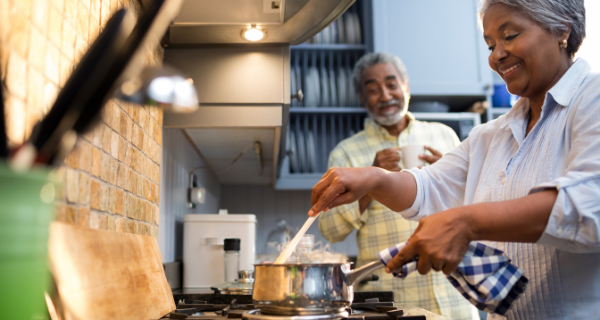The kitchen has become central to American life, so much so that Julia Child’s kitchen from her Massachusetts home is a permanent exhibit at the Smithsonian Institution’s Museum of American History in Washington, D.C.
For many, the kitchen serves as a culinary hub and family gathering place.
As we get older, however, the kitchen can become an increasingly dangerous place, where a senior’s physical or cognitive decline may increase the potential for kitchen-related accidents, including fires and food-borne illnesses.
The saying “an ounce of prevention is worth a pound of cure,” is especially true in the kitchen. The easy-to-follow steps listed below will help limit the likelihood of accidents in and around the kitchen.
How to Reduce Kitchen Fire Hazards
While it’s impossible to eliminate every possible risk, there are many things you can do to prevent kitchen fires. You can minimize the risk of a fire by following these tips:
- Do not leave cooking food unattended. Doing so is one of the primary causes of kitchen fires. According to the National Fire Protection Association, unattended equipment was a factor in one-third of home cooking fires and accounted for roughly half of the associated fatalities.
- Keep ovens and stovetops free of food residue, which can ignite. If you are unable to clean your oven, ask either a loved one for help or hire a cleaning service.
- If the oven has an exhaust hood or duct over it, see that they are kept clean.
- Never allow dish towels and other cloth items to hang or sit near the burners.
- Avoid loose-fitting clothing when cooking so that no part of your garments can come in contact with flames; long sleeves are especially vulnerable to catching fire.
- Unplug countertop appliances, including the toaster, when they are not in use.
- Never cook while feeling drowsy, in a state of confusion, or after taking medication that might make you sleepy.
- Do not let the handles of pots and pans extend out beyond the stovetop, where you might accidentally bump them and spill the contents; always turn them facing in.
- Use a timer to automatically remind you that the oven and/or stovetop are in use.
- Make a habit of checking the kitchen every time you finish cooking to be sure everything is turned off.
How to Help Prevent Common Kitchen Accidents
According to the CDC, falling is the leading cause of unintentional home injury deaths in seniors – many of which can occur in the kitchen. Wet floors, either from a spilled drink or food, can increase the risk of slipping and falling, while sharp knives or glass dinnerware can be dangerous if dropped. Here are some ways to lessen the risk of common kitchen accidents:
- Keep the kitchen uncluttered and brightly lit when occupied.
- Heavy items, such as dishes, pots, and pans, should be stored at waist level.
- Do not use cabinets that are out of easy reach or require stepping stools.
- Use unbreakable plastic for glasses, cups, and dishes.
- Beware of spills that can create a slippery floor. If you cannot attend to the spill immediately, toss a kitchen towel over the spill as a visual reminder.
- Check the refrigerator for water leaks.
- Be certain that electrical cords do not present tripping hazards, or dangle from the counter to the floor.
- Protect your hands and wrists with oven mitts.
Protecting Against Food-Borne Illness
Anyone can develop food poisoning, but according to the U.S. Food & Drug Administration, seniors tend to be more susceptible because of “changes in our organs and body systems.” The FDA also notes, “our stomach and intestinal tract may hold on to foods for a longer period of time; our liver and kidneys may not readily rid our bodies of toxins, and our sense of taste or smell may be altered.”
To lessen the chance of contracting a food-borne illness and endangering others for whom you may be cooking, practice the following:
- Keep the temperature inside your refrigerator at 40 degrees Fahrenheit or below.
- Do not let leftover foods sit on the table after you have eaten; put them in the refrigerator immediately.
- Avoid cross-contamination by using separate cutting boards and knives for meats and vegetables. Wash hands with warm, soapy water after handling raw meat.
- Clean counters with food-safe anti-bacterial spray.
- Store meats and vegetables in separate sealed containers.
- Understand that spoiled food does not necessarily look or smell bad; either freeze or discard leftovers after three days. When in doubt, throw it out -- discard if you have any reason to suspect spoilage.
Ensuring that the kitchen remains the heart of the home now and in the future requires just a little forethought and planning. Cheers to a happy, healthy, and safe kitchen!
More Safety and Lifestyle Resources for Seniors
Staying safe, happy, and healthy as we grow older can pose a challenge, but there are many ways to mitigate one’s overall risk and thrive at any age. Explore more resources like these here.



